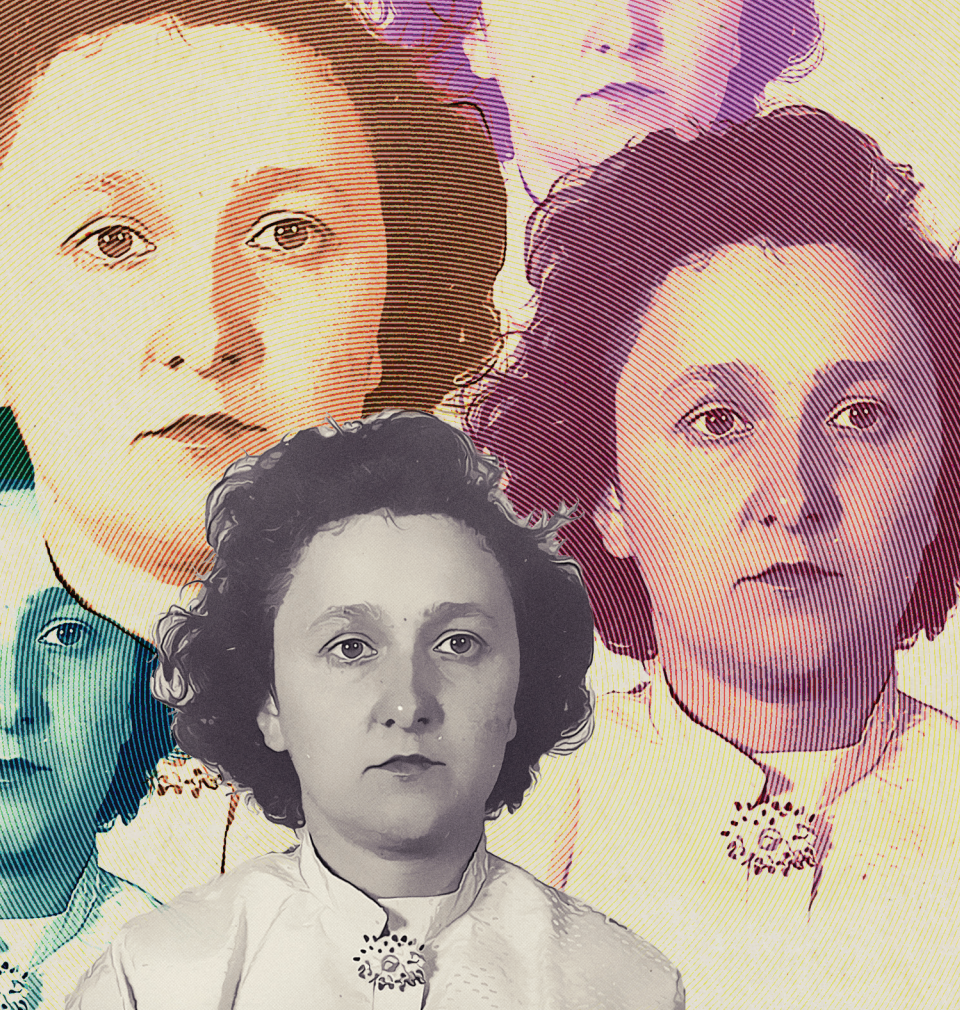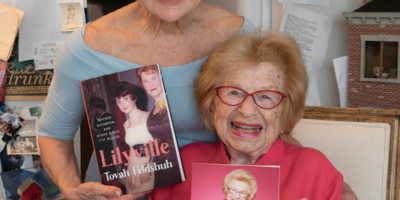
Ethel and Me
June 2021, which marked the 68th anniversary of the executions of Ethel and Julius Rosenberg for conspiracy to commit espionage, saw the publication of two new books about Ethel. Both Anne Sebba’s biography Ethel Rosenberg: An American Tragedy and Francine Prose’s novel The Vixen focus on Ethel as a Jew and a woman in the context of Cold War history.
Ethically, I couldn’t write about these as a traditional book review; the subject is too personal. Although I never met her, Ethel Rosenberg was my mother-in-law.
I married her younger son, Robby, 15 years after her execution. Still, as a Rosenberg family member and an author, I am struck by the contrast between the two books and by what they might teach us about how literature contributes to the historical narrative. Specifically, I’m trying to understand the tangle of historical truth and literary imagination: who owns Ethel and her place in the public narrative?
Anne Sebba is a prize-winning British biographer, lecturer, and journalist. A recipient of the Franco-British Society prize, she serves on the Society of Authors Council. Her nine previous books are mostly biographies of women, written with strong and well-researched historical context. Sebba focuses on women who have “carved out a life against the odds,” and Ethel Rosenberg is examined through a similar lens. Sebba first learned about Ethel when, as a young Jewish mother, she read E.L. Doctorow’s The Book of Daniel, which she describes as a “highly fictionalized but desperately dramatic version of events.” Sebba also evokes Ethel’s presence in Sylvia Plath’s The Bell Jar, where “Ethel’s imagined spirit infuses every fiber of what Esther Greenwood is suffering—not simply her imprisonment, but the madness of an America which incarcerated so many women in different ways during the early 1950s.” What intrigued me about Sebba’s work is her determination to look beyond the usual myths about Ethel Rosenberg. Sebba’s Ethel is a complicated woman who was betrayed by family and country, a woman with sometimes conflicting desires: deeply political, musical, theatrical, and determined to create a safe and loving family for Julius, Michael, and Robby despite poverty, antisemitism, and lack of support from her extended family.
Francine Prose is the author of more than two dozen novels and nonfiction works, including Mister Monkey and Reading Like a Writer. A former president of PEN America Center, she is the recipient of numerous awards and prizes, including the Rome Prize, the National Jewish Book Award, and Guggenheim and Fulbright fellowships. Beginning in 1953, her book The Vixen follows recent Harvard graduate Simon Putnam, a Jewish kid from Coney Island whose mother was a childhood neighbor of Ethel Rosenberg. When Simon lands his dream job working for a fancy publishing house, his first assignment is to edit a bodice-ripper novel titled The Vixen, the Patriot, and the Fanatic, which he is told is destined to save the publishing firm’s financial crisis. In the novel-within-a-novel, Ethel Rosenberg is the vixen and the fanatic, portrayed as a buxom seductress. Simon’s discomfort with the sensationalized and overwritten manuscript is at odds with his desire to become a part of the glitzy, moneyed world of publishing. The plot, as Simon tries to reconcile his family’s politics with the demands of his job, is as twisty as the Coney Island Cyclone.
Sebba, the granddaughter of Jewish refugees who settled in England, writes that she was fascinated by the “what if” of Ethel’s situation. Prose does not explain what drew her to this material, but The Vixen is just the most recent of dozens of novels, stories, films, and plays set to some extent on this dramatic historical stage. These works range from The Crucible to Angels in America, from The Book of Daniel to The Hours Count and The Public Burning.
Both book jackets feature archival photos. Sebba’s uses a less well-known image of Ethel exiting a car, flanked by three men who look like Feds. Prose’s features the iconic photo of Ethel and Julius kissing. While both images are black-and-white, the Prose photo is overlaid with splotches of primary colors. The books both open with the execution of Julius and Ethel Rosenberg in the electric chair on June 19, 1953, and both establish early a skepticism about Ethel’s conviction. Sebba writes of the “willingness of a government to orphan two children when it knew that the trial at which their mother was convicted was riddled with miscarriages of justice.” On the first page of her novel, Prose’s narrator Simon watches the television coverage of the execution with his parents. When he remarks that the personal label on his mother’s thrift-store blanket is lying, his mother responds, “Who isn’t?”
An interesting difference between the two books, not surprising given the two genres, is that while the Sebba book is meticulously researched and end-noted, the sources about the Rosenberg case cited by Prose are all at least two dozen years old. And while it’s true that the novel is set in the 1950s, Simon narrates it from many years later, at one point referring to his “grown children.” If this character is as obsessed with the Rosenberg case as he claims, it seems unlikely that his knowledge of the facts of the case would be so outdated, including no mention of released Grand Jury testimony or Walter Schneir’s definitive book, Final Verdict: What Really Happened in the Rosenberg Case.
Most important to me is the striking difference in how Ethel is portrayed in the two books. Sebba states her belief that, contrary to the usual description of Ethel as “ordinary,” she was anything but. Bringing a feminist perspective to her research, Sebba teases out the many aspects of the young Ethel, only 37 years old at her execution: passionate activist, under-appreciated daughter, talented singer and actress, and distraught mother of a difficult child. Prose’s characterization is more difficult to pinpoint because The Vixen gives us two Ethels: the “real-life” Ethel who Simon’s mother knew as a girl is portrayed as “stupid and proud and full of herself,” and also the fictional Esther Rosenstein, character in the novel Simon is editing—a novel allegedly written by a resident of a luxury mental hospital. The “real” fictional Ethel follows the typical portrayal of Ethel as victim; the doublefictional Ethel Esther is, as Prose puts it, “a calculating seductress, an amoral Mata Hari who used her beauty and her irresistible sex appeal to dominate her impotent husband and lure a string of powerful men into putting the free world at risk of nuclear Armageddon.” Over-sexualizing Ethel is nothing new; in Robert Coover’s The Public Burning, Ethel is the object of Richard Nixon’s sexual fantasies.
In her cover endorsement of The Vixen, Yiyun Li writes that the novel “interrogates the murky symbiotic relationship between history and individuals.” That relationship, that murkiness, is what interests me most in thinking about these new books. As a writer and a reader, I admire stories that illuminate history, novels that examine, question, reimagine the past as a way to understand, and learn to do better. But I am also a member of a family that has been deeply plundered for the dramatic content of our family tragedy. Some of those uses, like the goldfishes named Ethel and Julius in Charles Baxter’s The Feast of Love, or Ethel saying the mourners’ Kaddish for Roy Cohn in Tony Kushner’s Angels in America, are so creative, so brilliant that the historical is transformed and art is made. But others of those literary uses have been ugly and offer no insight, like Ethel’s sexual assault in the The Public Burning, or like “Daniel,” the character of my brother-in-law, burning his wife’s thighs with a cigarette in The Book of Daniel, or like Doctorow turning my husband into “A boy named Sue,” a girl who can’t deal with the family legacy and kills herself.
The literary appropriation of my family story often feels like a violation. When a novel uses the Cliff Notes version of historical events as a backdrop for their story, when it names the history but changes facts and imagines alternative–usually twisted and ugly–realities, and especially when it sensationalizes the record for the dramatic effect, then readers often believe the fictional version is the truth. My brother-in-law has been asked how his sister is doing, poor girl. This is particularly true when the author is accomplished and respected like Doctorow, like Coover, like Prose. In fact, Prose acknowledges this issue in her novel. “…Ethel Rosenberg had been a real person, on the surface so like Anya’s Esther Rosenstein that people would think she was writing about the real woman,” Prose writes.“If readers had been uncertain about Ethel’s alleged crime, by the time they’d spent hundreds of pages inside her twisted commie psyche, they would know she was guilty of espionage and worse.”
Each time I read a new book about my family story, I ask myself three questions: does the book add to, or warp, the public narrative of the events? Does it contribute to our understanding of the complexities of the history? Does it elicit our empathy for the long-dead players, who were, after all, imperfect people, like each of us, confronting the terrible choices often faced by passionate changemakers?
Ethel Rosenberg: An American Tragedy offers nuanced ways of understanding the history and Ethel’s role as neither victim nor dupe. Sebba’s Ethel is a troubled mother, a “profoundly moral woman” and a woman of her time facing unprecedented attack with as much integrity and grace as she could muster. The Vixen, when you include the “spoilers” not mentioned here, can be seen as contributing to the public narrative and the complexities of the cultural milieu. Remember that I’m not unbiased…but I found The Vixen’s Ethel deeply problematic. Prose acknowledges Ethel as a “real” historical figure, but her cardboard Ethel bounces between seductress and frumpy housewife, between spy and victim, bereft of agency, humanity, or morality.
Ellen Meeropol is the author of four novels, most recently Her Sister’s Tattoo, and the play Gridlock.




